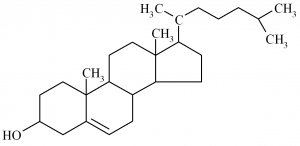Bad Cholesterol
 When someone mentions cholesterol many will say, how is your HDL? Cholesterol travels through the blood attached to lipoproteins. From a health prospective we try to maintain the good cholesterol (High density lipoproteins or HDL) and decrease the bad cholesterol (Low density lipoproteins or LDL). The HDL aids the body in removal of bad cholesterol in the blood whereas LDL causes build up of plaque within arteries restricting blood flow and hardening of the arteries that may result in heart disease. Control of cholesterol levels is through a number of ways such as low cholesterol diets, weight loss and drugs.
When someone mentions cholesterol many will say, how is your HDL? Cholesterol travels through the blood attached to lipoproteins. From a health prospective we try to maintain the good cholesterol (High density lipoproteins or HDL) and decrease the bad cholesterol (Low density lipoproteins or LDL). The HDL aids the body in removal of bad cholesterol in the blood whereas LDL causes build up of plaque within arteries restricting blood flow and hardening of the arteries that may result in heart disease. Control of cholesterol levels is through a number of ways such as low cholesterol diets, weight loss and drugs.
Cholesterol is a crucial fat-like substance produced by the liver that is required for bodily functions. It is the main sterol synthesized and transported in the blood plasma of all animals. Cholesterol is responsible for a number of functions such as:
1. Building and maintenance of the cell membranes
2. Production of sex hormones (androgens and estrogens)
3. Production of bile
4. Metabolism of fat-soluble vitamins, including vitamins A, D, E, and K
5. Insulation of nerve fibers
6. Conversion of sunshine into vitamin D
Cholesterol being a crucial part of our development can have a dark side. The gene DHCR7 (7-dehydrocholesterol reductase) found on chromosome 11 is responsible for the production of cholesterol and mutations in the gene may lead to a metabolic disorder known as SLOS (Smith-Lemli-Opitz Syndrome). This disorder currently occurs once out of every 20,000 births. Individuals with SLOS are unable to produce enough cholesterol to support normal growth and development. This leads to developmental delays, physical malformations, mental retardation and issues with major organs such as the heart. Currently the only treatment for the disorder is cholesterol supplementation to improve growth and developmental progress.
SLOS is inherited in an autosomal recessive pattern, basically both copies of the gene within a cell are mutated. This identifies that the parents of a person with SLOS each carry a mutated copy of the gene, however they do not have any symptoms or signs of SLOS. It may be that genetic counseling may be one form of a preventative method for the disorder. This brings up a great question, should genetic counseling be mandatory for potential parents to decrease transmission of severe genetic disorders?
| Print article | This entry was posted by Jermel Watkins on April 12, 2012 at 11:27 am, and is filed under Your Genes, Your Health. Follow any responses to this post through RSS 2.0. You can leave a response or trackback from your own site. |









